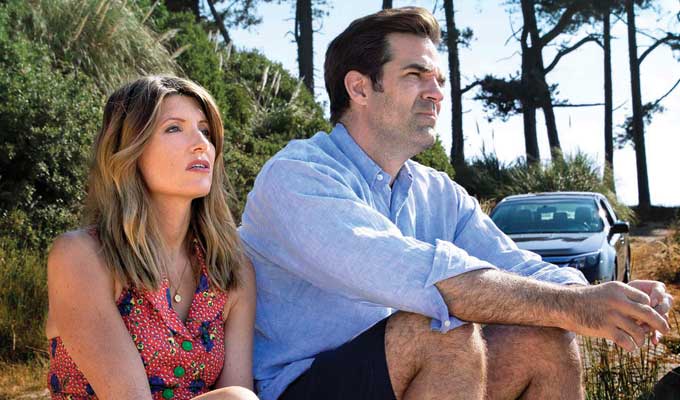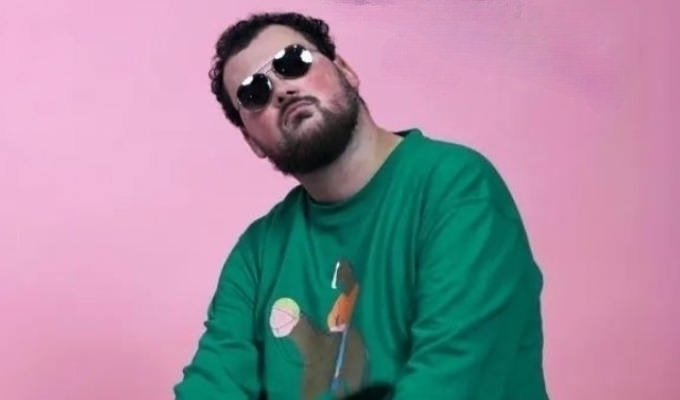 © Channel 4
© Channel 4 How the BBC turned down Catastrophe
...and why it's coming to an end after four series
It is one of the most acclaimed sitcoms of modern times, but the BBC turned down the chance to air Catastrophe – even though they commissioned the pilot in the first place, its creators have revealed.
Co-star Rob Delaney joked that the Corporation had made a ‘horrible mistake’ in rejecting the script that he and Sharon Horgan wrote for them.
But they praised Channel 4 for picking up the show – which is about to air its fourth and probably final series – and helping make it into the hit it became.
‘I was doing stand-up in London and my manager said, "Hey do you want to write a pilot for the BBC?",’ Delaney recalled of the show’s genesis. ‘And I was like, "Yes of course!"
‘But I wanted it to be good so I rang Sharon and said "Let’s write a pilot together."
‘Then we gave it to the BBC, and they said, "This is great! We don’t want to make it!"
‘So we brought it to Channel 4 and they were like, "We’ll give it a shot."’
Delaney praised the broadcaster for their input, saying: ‘We knew we wanted to do a husband and wife, but kudos to Channel 4 for being like, "Maybe we should show how they met" because we totally started in the middle. Channel 4 deserves a lot of credit for helping shape it into what it became.’
Horgan also said she understood why the BBC turned Catastrophe down, suggesting that a sitcom about a husband and wife was ‘a small idea’.
‘They were lovely about it but maybe it wasn’t the right thing for their channel,’ she said. ‘I can’t remember. It also got a lot better from that original script.’
The pair had originally met after making contact on Twitter because of their mutual admiration.
‘I wrote to Sharon because she wrote Pulling, and that was the greatest sitcom I’d ever seen,’ Delaney told an audience at the British Film Institute in London on Friday night. ‘We just met and chatted. We thought our senses of humour might work well together.’
‘It was awkward, though, wasn’t it?’ Horgan said of their first meeting in a Los Angeles hotel.
‘A little bit,’ Delaney conceded
They found a working routine through ‘trial and error, sitting together yakking’, Horgan says. But some practicalities soon emerged.
Delaney said: ‘Some distance into writing series one, Sharon just blurted out: "I have to be the one with the laptop! I can’t think if my fingers aren’t moving!" So from that moment on Sharon just had to be the scribe.’
Horgan said she took the keyboard because: ’The thing with Rob is that he doesn’t always know when amazing stuff is coming out of his mouth; so I just immediately start writing it down.’
According to Delaney, their process for creating each series s that 'we outline like crazy people, write terrible first drafts, and the rewrite and rewrite and rewrite and rewrite.’
The pair were stunned when interviewer Emma Kennedy told them that Caroline Aherne and Henry Normal only ever wrote one draft of their scripts for the Royle Family ‘because they wouldn’t take notes’ from producers or other TV executives.
‘We love notes,’ Delaney said. ‘It puts some oxygen into it.’
And Horgan said rewriting saved the agony of trying to get the perfect script first time. ‘I used to really beat myself up if the good stuff wasn’t coming out,’ she said. Now I think the best way is to just get it down.’
And they also insist on making sure they read out loud everything they put on the page. ‘Because one thing we really to do is try not to have anybody sound clever or written,’ Delaney said. ‘So we make sure to say things out loud, then transcribe, then read it out loud 100 times so it doesn’t sound like some smart, clever writer. We hate stuff like that.’
Horgan said that writing with a partner also helped hide the writing behind the characters, saying: ‘When you write on your own you can’t do that so much.’
‘We set out to make it as real as possible,’ she added. ‘While it’s really important to us that it is funny, it is a comedy, we didn’t want any of the ideas to be sitcom tropes. We wanted real stories that happen to real people.’
And that includes making sure the sex scenes are realistic. ‘We never wanted them to look pretty,’ Horgan says. ‘We wanted it to look real - and rank.’
Although the pair like their dialogue to be naturalistic, the one thing they won’t allow is their actors to improvise. ‘Are you precious about your scripts?,’ Kennedy asked then. ’Big arseholes,’ said Delaney bluntly.
‘Our cast always bring something to the roles we’re not expecting, but they are not allowed to improvise,’ Horgan explained. ‘I think it’s hard to improvise on something really tightly scripted.
‘We already did the improvising because we transcribe what we’ve been saying,’ Delaney adds. ‘Sure WE improvise, but we’re not going to let you fucking see it. We want to make sure it’s good.’
They did make one exception: for Carrie Fisher, who played Rob’s mum.
On her first appearance on the comedy, she had to have a blazing phone row with Sharon. ‘‘We just went at each other,’ Horan revealed. ’It was the first we ever met, and she definitely called me a cunt. It was ferocious.’
‘We each did a scene with her that makes maybe 50 seconds of film,’ Delaney added. ‘But we were both on the phone for about 45 minutes each just screaming. It was awesome.’
Horgan paid tribute to the star, who died two years ago this month: ‘She was a joy. Exactly what you wanted. Someone you just wanted to be around. She was really open about her interesting Hollywood upbringing and her difficulties as well.’

The pair also said they were drawing Catastrophe to a close before they tired of it.
‘We’ve been doing it for five years, we’ve made four series that we love,’ Horgan said.
‘We’re very proud of it,’ Delaney added. ‘We made exactly what we wanted to make, for better or for worse and we just wouldn’t want to snuggle to come up with storylines. We’ve said what we want to say.’
But he left the door open for a possible return at some point, saying: ‘Anything can happen,’ and adding that he was ‘sure’ he would work with Horgan again on something in the future. ‘I think we have a good little thing going,’ he said.
Asked if they had ever considered making a movie version of Catastrophe, Delaney added: ‘We thought maybe series three was going to be a movie - and then it wasn’t. And then we did this series, which wasn’t.
‘In the UK people watch it one episode at a time, but in the US people watch it in one fell swoop and it s roughly the length of a movie. So we do conceive each series like a movie, perhaps more than other TV shows might.’
The fourth series marks a natural progression for their characters, who were thrown together when a one-night stand ended in pregnancy and they had to forge a relationship through the chaos of their lives.
‘At the end of series three they realised "This is our pile of garbage" ,’ Delaney said of their situation, before extending the metaphor awkwardly. ‘Now they are trying to weave it into a tapestry they can use as a blanket.
‘They love each other, but love takes work.’

When a fan praised Horgan for not being afraid to show flawed female characters, she credited Delaney and Dennis Kelly, who co-wrote Pulling with her. ‘I think having writing men in my life have created the female characters,’ she said. ‘I cannot take full credit for them. Having the male voice in there really helped write those characters.’
And she said she had been influenced by Roseanne Barr’s self-titled sitcom, saying: ‘She was a great lead female character and in a way her gender didn’t matter at all.
‘At the time when I started out, I’d say 98 per cent of sitcoms were written by men, so the female characters were either great forgiving wives or mothers or care-givers or joke setter-uppers, so I didn’t want that.’
- Catastrophe returns to Channel 4 in January. Meanwhile the first three series are available on All4.
Published: 10 Dec 2018






